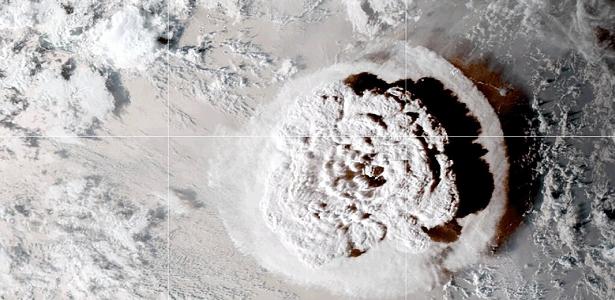Since the beginning of the year, the Earth’s atmosphere contains more water vapor than usual.
On January 15, 2022, the submarine volcano Hunga Tonga-Hunga Ha’apai erupted near the Pacific island of Tonga, causing a tsunami and a sonic boom with sound waves that spread around the world on two occasions.
This volcanic eruption is considered one of the most powerful eruptions ever recorded on the planet. Now, a group of scientists has discovered that its effects go beyond lava, ash, and rumble.
A study conducted by the Jet Propulsion Laboratory of NASA, the US space agency, in California (USA), which was published in the latest issue of the journal Geophysical Research Letters, showed that the volcano also released a huge amount of water vapor into the atmosphere.
The amount was so large that scientists feared it would warm the Earth’s surface more than expected – although its effect is only temporary.
“This volcanic eruption could affect the climate… through surface heating, due to the radiative force of the excess stratospheric water,” the study reports.
The article explains that this is an anomalous effect, as large volcanic eruptions usually cool the planet’s climate, due to ash clouds covering the sun. It is the so-called “volcanic winter” – an example that occurred after the eruption of Mount Tambora in Indonesia (1815), which launched the “year without a summer” in 1816.
Huge amount of water
The study indicates that the amount of sulfur and other substances released by the Hunga Tonga – Hong Hapai was negligible compared to the amount of water.
Scientists believe that volcanic activity threw 146 teragrams (146 million tons) of water into the stratosphere, between 12 and 53 kilometers above the Earth’s surface.
To give you an idea, the amount of water vapor released would be enough to fill 58,000 Olympic swimming pools – equivalent, according to research, to 10% of the water already in the stratosphere.
According to the study, “This is not surprising, as the Honga Tonga-Hung Hapai Caldera was located 150 meters below sea level. The powerful explosion released water vapor at altitudes of up to 53 kilometers.”
eruption violence
1 – Magma rises at high speed
2 – High-velocity magma contact with cold water causes a “fuel-coolant interaction”
3 – Magma fragments and pieces are exposed to a larger amount of sea water
4 – Chain reaction and a large chemical explosion
5- Particles travel faster than the speed of sound
Records indicate that this is the largest amount of water released into the stratosphere “by a volcano or otherwise” since the beginning of the “satellite age”.
That’s because the discovery was made by an instrument called the Microwave Limb Sounder, which is on NASA’s Aura satellite. The satellite measures water vapor, ozone and other atmospheric gases.
“We’ve never seen anything like it before,” study author Lewis Millan, of NASA’s Jet Propulsion Laboratory, said in a statement. “We had to carefully check all measurements to make sure they were reliable.”
heating
The study predicts that this increased amount of water vapor could heat the Earth’s surface, as one of its functions is to capture heat from the sun.
Researchers believe that excess water vapor can remain in the stratosphere for several years, causing chemical reactions that weaken the Earth’s protective ozone layer.
But they note that this effect will be smaller and temporary, and will dissipate as the excess vapor is reduced.
Therefore, he does not think that it is enough to amplify the climatic changes caused by human activities, which we have all encountered.
– This text was published in https://www.bbc.com/portuguese/internacional-62425225

“Coffee trailblazer. Social media ninja. Unapologetic web guru. Friendly music fan. Alcohol fanatic.”

